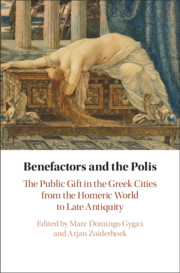 Benefactors and the Polis
Benefactors and the Polis from Part III - Hellenistic Benefactors
Published online by Cambridge University Press: 21 January 2021
This chapter considers the ‘vase festivals’ recorded on Hellenistic Delos as benefactions, and then considers the implications of this approach on our chronology for the period. It argues that the vase festival was a socially constrained form of competitive display, one open only to Delians and others who successfully sought and negotiated this privilege. Through the endowment and the associated display, these individuals claimed and performed a distinct superior status: as patrons of the sanctuary. But this was not an exclusive claim. It coexisted with and competed with other claims, both when they were founded and in subsequent years. As such, the dates and periods during which royal (and non-royal) individuals founded these vase festivals (Third Ptolemaea, 246/5 BC, Soteria/Antigonia, 245/4 BC, etc.) can be understood as periods of engagement by those individuals on Delos and the region. But this competitive context indicates that they should not be understood as dates for changes of control. Quite the reverse: if the vase festivals have any implication for our understanding of the broader geopolitical terrain – and they may not – they indicate that these were times when interest in the sanctuary and the region were higher, and when any specific patronage or hegemonic relationships in the sanctuary and the region were particularly contested.
To save this book to your Kindle, first ensure no-reply@cambridge.org is added to your Approved Personal Document E-mail List under your Personal Document Settings on the Manage Your Content and Devices page of your Amazon account. Then enter the ‘name’ part of your Kindle email address below. Find out more about saving to your Kindle.
Note you can select to save to either the @free.kindle.com or @kindle.com variations. ‘@free.kindle.com’ emails are free but can only be saved to your device when it is connected to wi-fi. ‘@kindle.com’ emails can be delivered even when you are not connected to wi-fi, but note that service fees apply.
Find out more about the Kindle Personal Document Service.
To save content items to your account, please confirm that you agree to abide by our usage policies. If this is the first time you use this feature, you will be asked to authorise Cambridge Core to connect with your account. Find out more about saving content to Dropbox.
To save content items to your account, please confirm that you agree to abide by our usage policies. If this is the first time you use this feature, you will be asked to authorise Cambridge Core to connect with your account. Find out more about saving content to Google Drive.